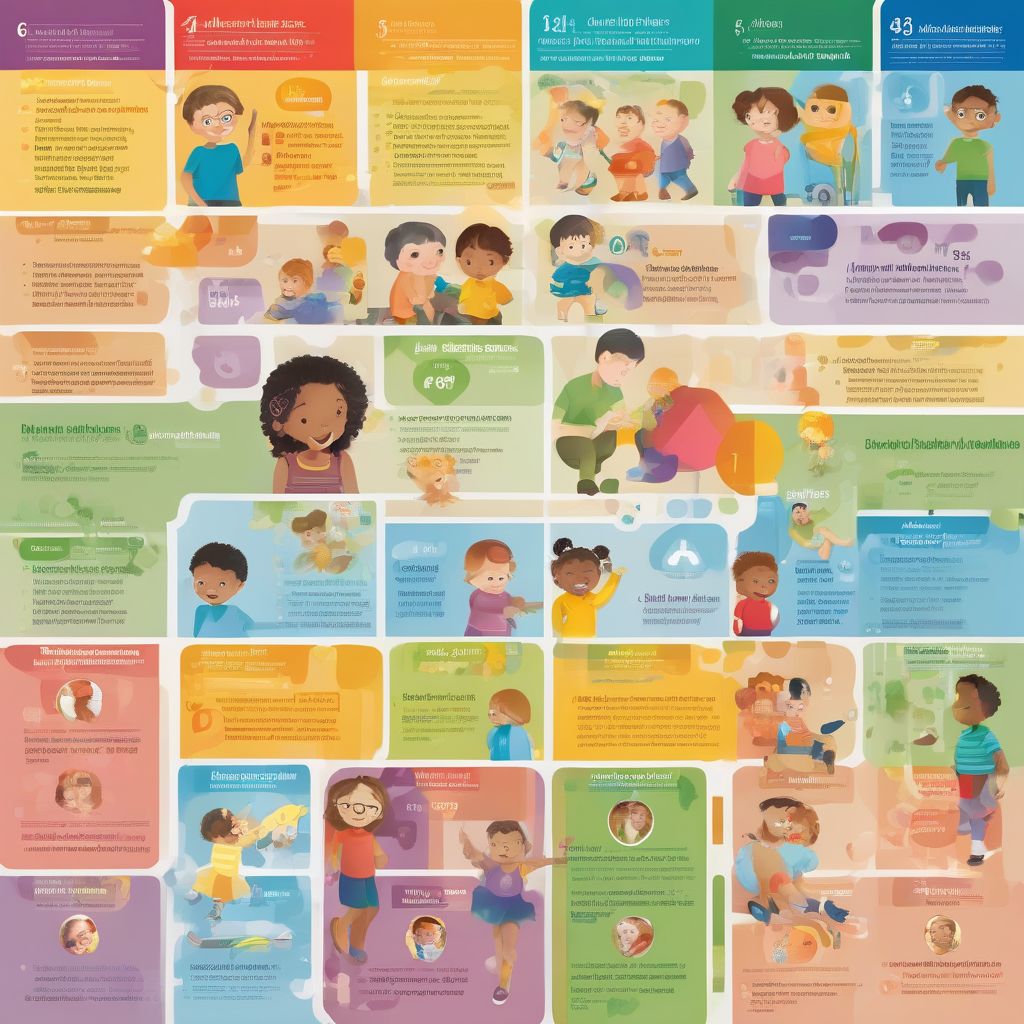“Give a child the world, and they’ll want the moon.” This saying highlights the boundless curiosity and potential within every child. As parents and educators, we strive to nurture that potential, especially when it comes to academic success. But did you know that a child’s journey toward academic achievement is deeply intertwined with their developmental milestones?
Understanding Developmental Milestones
Developmental milestones are like stepping stones on a child’s path to growth. They mark specific skills and abilities children typically achieve at certain ages, encompassing four primary domains:
- Physical: This includes gross motor skills (like walking, running) and fine motor skills (like holding a crayon, using scissors).
- Cognitive: This involves thinking, learning, and problem-solving skills, such as language development, memory, and attention.
- Social-Emotional: This covers a child’s ability to interact with others, understand and manage emotions, and form relationships.
- Communication and Language: This encompasses a child’s ability to understand language, express themselves verbally and non-verbally, and develop literacy skills.
 Developmental Milestones Illustration
Developmental Milestones Illustration
These milestones aren’t just checkmarks on a developmental chart; they are foundational building blocks that lay the groundwork for academic success.
The Interplay: How Milestones Influence Learning
Imagine a child struggling to hold a pencil due to underdeveloped fine motor skills. Participating in activities like writing or drawing becomes challenging, potentially impacting their enthusiasm and performance in these areas. This example illustrates how developmental milestones directly impact a child’s readiness and ability to learn.
Here’s a closer look at the connection:
- Cognitive Milestones: A child who has developed strong language skills can understand instructions better, follow complex directions, and express their thoughts and ideas effectively—all crucial for academic performance. Similarly, good memory and attention skills are essential for information retention and focused learning.
- Physical Milestones: Don’t underestimate the importance of physical development. A child with strong gross motor skills can participate comfortably in physical activities, boosting their overall well-being and concentration. Meanwhile, well-developed fine motor skills are essential for writing, drawing, and using tools, all fundamental to academic tasks.
- Social-Emotional Milestones: A child who can manage their emotions effectively is more likely to navigate classroom dynamics, build relationships with peers, and cope with challenges constructively—fostering a positive learning environment. Strong social skills facilitate collaboration, communication, and a sense of belonging in the classroom.
- Communication and Language Milestones: This is perhaps the most obvious connection. A child with well-developed language skills can understand what’s being taught, follow instructions, express their thoughts and ideas, ask for help when needed, and engage in meaningful discussions, all of which are fundamental to academic success across all subjects.
When Milestones Are Missed: Identifying Potential Challenges
While every child develops at their own pace, consistently missed milestones can signal potential developmental delays that might affect academic performance. Here’s when to seek further evaluation:
- Significant Delays: If a child shows a considerable lag behind their peers in multiple developmental areas.
- Persistent Challenges: If a child struggles with a specific skill set for an extended period despite interventions and support.
- Academic Difficulties: If a child experiences persistent academic difficulties despite having average intelligence and no learning disabilities.
Early intervention is key. Identifying and addressing developmental delays early can make a significant difference in a child’s academic trajectory.
Supporting Your Child’s Development and Academic Journey
As parents and educators, we can play a vital role in supporting children’s development and setting them up for academic success. Here are some practical tips:
- Provide a Stimulating Environment: Create a home and classroom environment rich with opportunities for exploration, play, and interaction. Offer age-appropriate toys and activities that challenge and engage children across all developmental areas.
- Encourage Active Play: Physical activity isn’t just good for the body; it’s great for the brain! Encourage children to engage in regular physical activity—running, jumping, climbing—to develop their gross motor skills and coordination.
- Focus on Fine Motor Activities: Offer activities like drawing, coloring, puzzles, and building blocks to refine fine motor skills, hand-eye coordination, and dexterity.
- Read Together Regularly: Make reading aloud a part of your daily routine. This enjoyable activity promotes language development, expands vocabulary, improves listening skills, and sparks a love for learning.
- Talk, Talk, Talk: Engage children in conversations, ask open-ended questions, and encourage them to express their thoughts and feelings. This fosters language development, communication skills, and social-emotional intelligence.
- Play Games: Board games, card games, and even simple games like “Simon Says” are fantastic for developing cognitive skills like memory, attention, problem-solving, and turn-taking.
- Practice Patience and Celebrate Milestones: Every child learns and develops at their own pace. Be patient, provide encouragement, and celebrate their achievements, no matter how small they may seem.
Nurturing a Love for Learning: A Lifelong Gift
The connection between developmental milestones and academic success is undeniable. By understanding these milestones and providing a supportive and stimulating environment, we empower children with the tools they need not only to excel academically but also to become well-rounded individuals ready to embrace lifelong learning.
[amazon bestseller=”child development books”]
Conclusion
The journey of childhood development is paved with significant milestones that serve as stepping stones to academic success. From language acquisition to social-emotional regulation, each milestone plays a crucial role in shaping a child’s ability to thrive in an academic setting.
By recognizing the importance of these developmental stages and providing nurturing, stimulating environments, we can empower children to reach their full potential. Remember, every child learns and develops at their own pace, and celebrating their individual achievements is paramount.
Do you have any experiences or tips to share regarding supporting children’s developmental milestones and their academic journeys? Share your thoughts and insights in the comments below! Let’s continue this important conversation and learn from one another.
